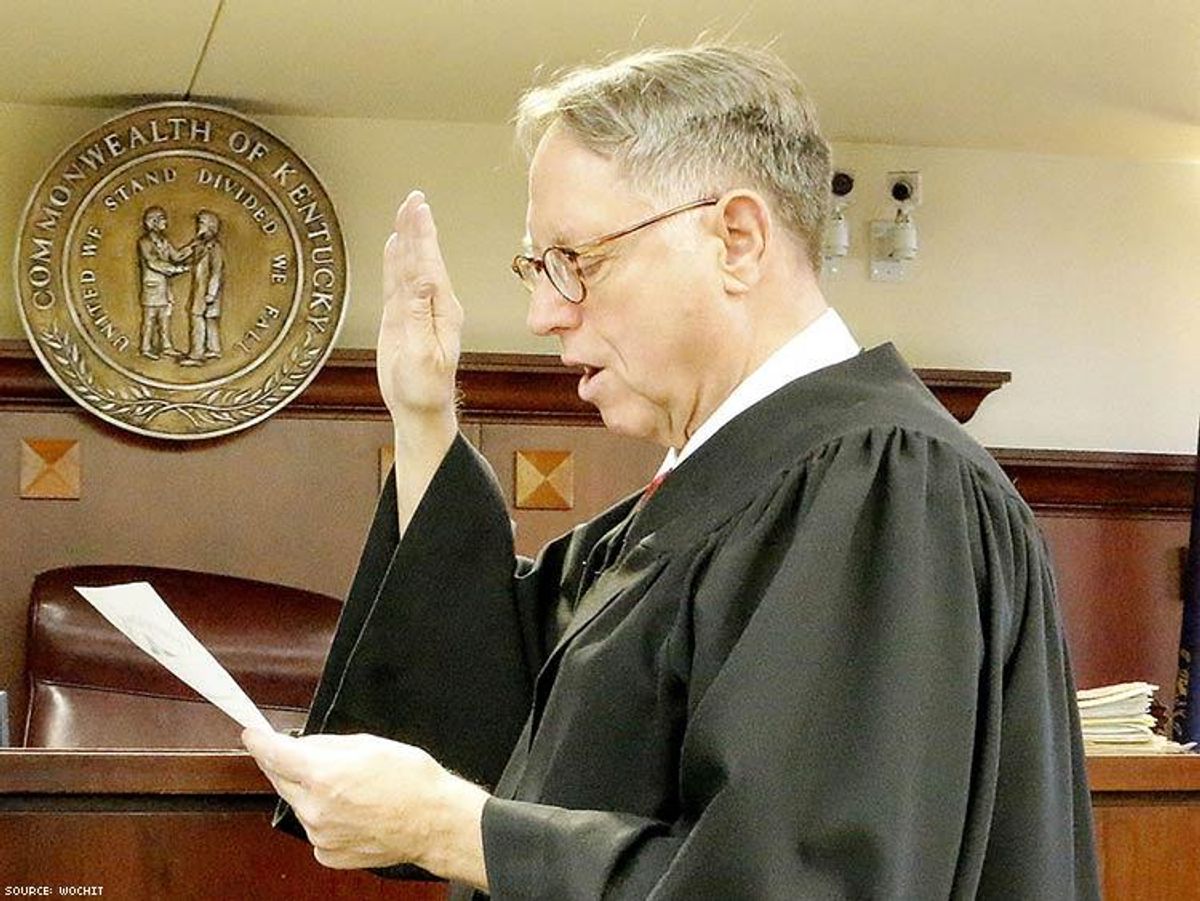Families
Kentucky Judge Won't Hear Gay Parents' Adoption Cases

Judge Mitchell Nance cited his "conscientious objection to the concept of adoption of a child by a practicing homosexual."
May 02 2017 10:52 AM EST
May 02 2017 10:52 AM EST
trudestress
By continuing to use our site, you agree to our Private Policy and Terms of Use.

Judge Mitchell Nance cited his "conscientious objection to the concept of adoption of a child by a practicing homosexual."
A family court judge says he will no longer hear adoption cases involving gay parents, as "a matter of conscience."
Judge Mitchell Nance issued an order last week recusing himself from such cases because of the possibility of bias, citing his "conscientious objection to the concept of adoption of a child by a practicing homosexual," reports Kentucky's Glasgow Daily Times. Nance works in family court in the state's 43rd Judicial District, encompassing Barren and Metcalfe counties in south-central Kentucky.
"It's preemptive in nature," Nance told the paper of the order. "I wanted to preempt there from being any uncertainty if the situation arose."
Another judge in the district, John T. Alexander, said he would hear any of the cases from which Nance recused himself. He has no objection to hearing cases involving gay parents, "so it should not affect the ability of any same-sex couples to adopt in Barren or Metcalfe counties," Alexander told the Daily Times.
Nance's action, which is being compared to Kentucky county clerk Kim Davis's refusal to issue marriage licenses to same-sex couples, received praise from a Kentucky right-wing group, but others said it calls into question his fitness to continue serving as a judge.
"If we are going to let liberal judges write their personal biases and prejudices into law, as we have done on issues of marriage and sexuality, then, in the interest of fairness, we are going to have to allow judges with different views to at least recuse themselves from such cases," Kentucky Family Foundation spokesman Martin Cothran said in a press release, according to the Daily Times.
When adoption agencies abandon the idea that it is in the best interest of a child to grow up with both a mother and a father, people can't expect judges who do believe that to be forced to bow the knee," he continued.
Kentucky Fairness Campaign director Chris Hartman told the paper Nance's move is "pure discrimination," adding, "If Judge Nance can't perform the basic functions of his job, which are to deliver impartiality, fairness, and justice to all families in his courtroom, then he shouldn't be a judge."
Some lawyers tended to agree with Hartman. "The bottom line is if this judge can't fulfill his duties because of his personal biases, he should resign," Dan Canon, a lawyer who represented same-sex couples in marriage equality cases, told The Courier-Journal of Louisville.
Indiana University law professor Charles Geyh told the Louisville paper, "He has taken an oath to uphold the law, which by virtue of the equal protection clause does not tolerate discrimination on the basis of race, religion or sexual orientation. If he is unable to set his personal views aside and uphold the law -- not just in an isolated case, but with respect to an entire class of litigant because he finds them odious -- it leads me to wonder whether he is able to honor his oath."
And University of Louisville law professor Sam Marcosson told The New York Times, "What we have is a judge who has made a record of his inability to be a fair and impartial judge for a whole class of citizens who are entitled to have a fair and impartial judge. It raises serious problems about his fitness for office going forward."
Nance told the Daily Times at least two cases involving gay parents had come to him during his career. There was one several years ago from which he recused himself, then one a few months ago in which he actually ruled in favor of gay parents seeking to adopt. The latter case made him decide he should opt out of any further cases.
"It made the matter come to my awareness more directly, I would say," he told the Glasgow paper. "I felt it would be more prudent to go ahead and address it."
In Davis's case, she shut down all marriage license operations in Rowan County shortly after the U.S. Supreme Court's marriage equality ruling. After four couples sued, she went to jail rather than obey a federal judge's order to issue licenses without discrimination. She was released after her deputies agreed to handle same-sex marriages, and now Kentucky has removed clerks' names from licenses, a move that accommodates Davis's religious objections.
Viral post saying Republicans 'have two daddies now' has MAGA hot and bothered